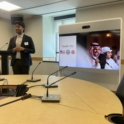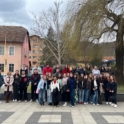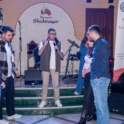Abdulaziz reflects on the highlights from serving as a mentor for CEW.
STORIES
Screening "Jews of Egypt"
By: Abrar Abdulla (YES 2012 - 2013, Bahrain, hosted by ACES in Aledo, IL)
My friend Fatema Nooruddin and I, Abrar Abdulla, collaborated with the History Association and the Religious Study Program at the American University in Cairo (AUC) to organize a film-screening of the documentary "Jews of Egypt", followed by a discussion that was led by members of the Jewish community in Egypt.
The event was held on November 28, 2016 at the American University in Cairo (AUC), Egypt. Many students and members of the university faculty attended the event, in addition to special guests from the US Embassy. The event was moderated by the Head of the Comparative Religions Program, Mr. Adam Duker. Our guest speakers included Mrs. Magda Haroun, the Head of the Cairene Jewish community, and Mr. Albert Arie, a board member in the ‘Drops of Milk’* NGO. This NGO members have various backgrounds, Muslims, Christians and Jews. Last but not least, the movie producer Mr. Haitham Al Khamissi was a guest speaker as well. Mr. Al Khamissi shared his experience in putting together the movie and approaching an excluded religious minority in Egypt due to the politicization of their issue.
We chose to represent the issue of the Jews of Egypt, because there are lots of misconceptions regarding the Arab Jews. Some directly associate them with Israel or the Zionist movement, thus, there is animosity towards them, and many even reject them and call for their elimination from the Arab community. The movie screening highlighted the historical background of the Egyptian Jews' forced migration from the first half of the twentieth century until their second grand exodus after the tripartite attack of 1956, which resulted in fragmented families and disturbance to the previous cosmopolitan Egyptian society that soon became intolerant towards the Jews.
Through the event, and especially the follow up discussion, it was apparent that the movie clarified lots of misunderstandings regarding the Jews and it promoted interfaith between the diverse community members. The Egyptian Jews had to face an identity crisis as they were denied the rights to be Arabs simultaneously to embrace their religion. “I am not Jewish Egyptian … I am an Egyptian Jew” is one of the most notable statements that was made by one of the members of the Egyptian Jewish community who was forced into exile.
Very few Jews remain in Egypt, therefore, preserving their heritage and holding such events are the only option left to revive the memory of the Jews in Egypt and how they contributed in flourishing their homeland, and later were rejected and exiled. The exclusion of "the other" was an action that was supported unconditionally by some members of the society.
The event received many positive reactions as people were thrilled to have some of the people who appeared in the movie to talk directly about their experience as members of the Jewish community. Nihal Zakaria, a student from AUC who attended the event stated “I always knew that Jewish people lived in Egypt in peace but I was under the impression that they had left voluntarily. The movie really showed me that they were more or less forced to evacuate and leave everything behind out of fear for their lives.” She added “This event is a good first step to bring the subject to the table and maybe make more people aware about the issue slowly but surely; however, more efforts should be done by the community in order to challenge very strong embedded idea that Jews and Zionists are interchangeable terms (believed by anti-Semites and Zionists alike), and the institutionalized hatred that is spread in the society”
Recognizing the issue is a stepping stone in order to reach reconciliation. Hence, the movie screening and the discussion were important in drawing attention towards the issue of the Arab Jews, which started as political but later the governments used religion to further marginalize people and create more antagonism. Jews became a synonym to Zionism and an antonym to Arabism. The event was important to achieve interfaith harmony. Drops of Milk and the movie production itself are examples of the coherence and coexistence of Muslims, Jews, and Christians within the Egyptian community, which is threatened by political propaganda and agendas.
Abrar (left in the photo above) represented Bahrain on the YES program, and considers Egypt her second community. She is currently studying in Egypt for an undergraduate degree in political science, specializing in international relations. Abrar also intends to minor in history and community development studies.
Photo Credits: Bayan Hasan and Zainab Al Haddad
*Drops of Milk was established to serve the widows, orphans and the disadvantaged members of the Jewish community, but due to the decline in the numbers of Jews in Egypt currently, the NGO aims at preserving the Jewish heritage and to promote interfaith.





